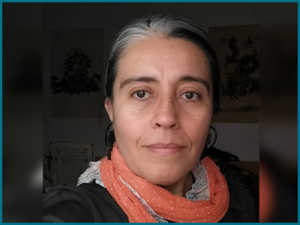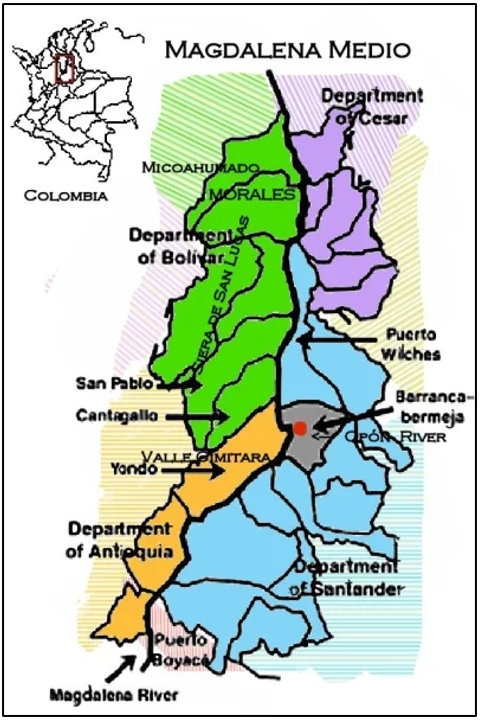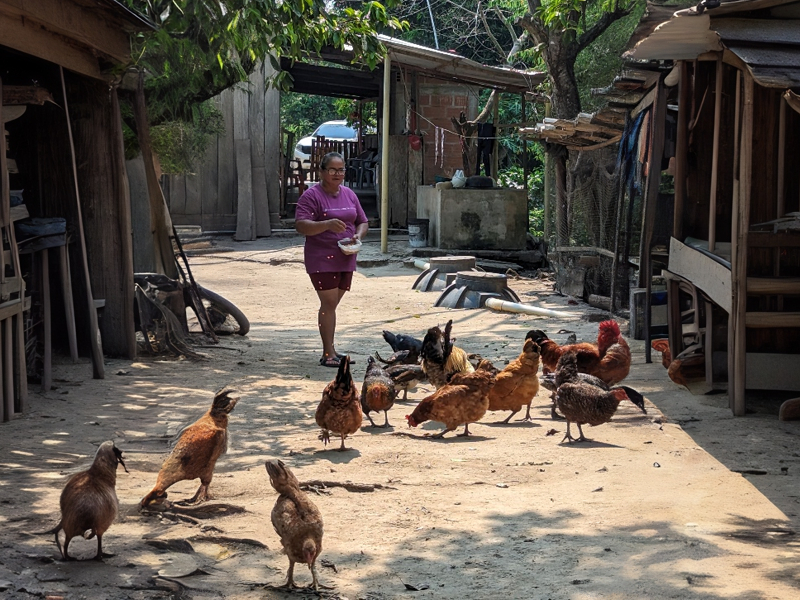A reclamation of space – how the women of Barrancabermeja, Colombia took back their territory during the OFP’s Humanitarian Mission

Early in the morning on March 9, women from various municipalities around Barrancabermeja, Colombia mobilized to participate and support their sisters from a neighbourhood called Comuna 7 in a march that left Camilo Torres Park at 7 am. Near the sports center, we got off the buses and chivas (colourfully painted buses) and began the march for the women. This kilometre-long walk was a public reclamation of space and a challenge to the illegal gangs that constantly control and limit the lives of women in Comuna 7. We called out to the women there. We invited them to come down and join us, to bring their pela’itos (babies), to bring their pains. And they came.

I am writing about the first Humanitarian Mission by and for women in Barrancabermeja. Throughout Colombia, there will be other humanitarian missions for women in territories threatened by armed conflict and illegal economies. But this mission is of particular interest to us because it was led by the women of the Organización Femenina Popular (OFP) and the Movimiento de Mujeres por la Paz y contra la Guerra (Women’s Movement for Peace and against War).
This Mission is part of the KAIROS Women of Courage: Women, Peace and Security Program that is wrapping up March 31. It is jointly funded by Global Affairs Canada and KAIROS through support from donors, member churches and unions.
In this part of the Magdalena River, known as Magdalena Medio, four departments (like a state or province) and their municipalities form a political and administrative unit and share a common past of violence and dispossession. Early on, this region suffered the consequences of the armed conflict and became a leader of social movements with the beginning of oil exploitation. Colombia’s first oil well was discovered here in Barrancabermeja over 100 years ago. Throughout this region’s bloody history of multiple struggles and few successes, women have embodied the face of the struggle for peace and civil society in the territories.
In Magdalena Medio, the OFP selected two communities to carry out humanitarian women’s missions: Comuna 7 in Barrancabermeja and Santa Roza in the Department of Bolivar.
Comuna 7 is a very old neighbourhood full of hard-working families whose livelihood comes from nearby land that was taken over illegally and where illicit economies operate with impunity, threatening daily life undermining the free movement of people, and co-opting the future possibilities of the younger generations. Drug trafficking and the economic activities that unfold around it – illegal micro-credits, usury, human trafficking, forced sex work, distribution, sale and consumption of illicit substances, and the permanent struggle for control of territories – have turned the entire population into captive markets, and cannon fodder for illegal armed groups.
More than 500 women from Comuna 7 and 200 others from around Barrancabermeja came to the activities of the Humanitarian Mission. They brought their complaints, they got their children, they brought the spirits of their dead ones and their pain in search of answers decades overdue. They came down from hamlets, walked through narrow streets without sewage systems, dodging sewage streams. They arrived with their pots to share the sancocho, a traditional soup. They added their voices and asked different institutions and organizations to give them back a little piece of dignity, to recognize their missing sons, their lost sisters. They came to tell them that every day, they have to pay tolls and fees to protect and circulate their goods and businesses. These women came to tell the authorities that the armed men of the illegal economies restrict and sometimes prohibit the police and other public servants’ access to the Comuna. Or is there an undeclared agreement in which the authorities agree not to intervene? One wonders how this is possible with the current government’s commitment to and current talks for Total Peace.

Some women came from rural areas and villages near Yondó, which we had visited the day before. They gathered courage and, holding hands, came to tell the government how the armed groups of guerrilla dissidents ordered small farmers, who had worked their land for generations, to hand over their farms to the armed groups’ supporters and friends. What a twisted way of embodying their revolutionary principles! You are left wondering, as you would with the illegal economies and the absence of police intervention, how is that even happening?
The Humanitarian Mission told those who want to enrich themselves on the lives of others, who impede joy, who sow fear and who sit unpunished that impunity will no longer protect them and that the complicit silence is over. The Purple Tents that help women impacted by gender-based violence, the songs and dances, the fires heating the pots for the sancocho were organized to share life, to celebrate joy, and to instill sorority.
In the Polipolvo of Comuna 7, we honoured the women who care for children and grandchildren, who await the arrival of the lost daughters, who mourn the nameless grave, but who continue to sustain life in the face of death that comes to offer them easy money and uncertain futures.
The Women’s Humanitarian Mission in Barrancabermeja was another clamour from the OFP to those in power, another demonstration of triumph of life.
Thank you for joining me and reading my blog. Your support for partners in this defense of life and dignity is more vital than ever.
You can help sustain the work of the OFP and KAIROS’ Women of Courage partners by donating today!
By Silvia Cristina Vasquez-Olguin, Global Partnerships Coordinator for Latin America and Gender Justice
Misión Humanitaria de y para las Mujeres de Barrancabermeja y Colombia
Desde temprano las mujeres de varios municipios alrededor de Barrancabermeja se movilizaron para participar y apoyar a sus hermanas de Comuna7 en una marcha que salió del Parque Camilo Torres a las 7 de la mañana. Una vez en las cercanías del centro polideportivo donde se iba a realizar la Misión, nos bajamos de autobuses y la chiva y comenzamos la marcha por las mujeres. Esta caminata de casi un kilómetro era un reto a las bandas ilegales que constantemente controlan y limitan la vida de las mujeres en Comuna 7. Las llamábamos a gritos, les invitábamos a bajar y unirse a nosotras, que trajeran los pela’itos, que trajeran sus dolores. Y ellas vinieron. Hoy les escribo para contarles de la primera Misión Humanitaria para y desde las Mujeres de Barrancabermeja este 9 de marzo. En todo Colombia se realizarán otras misiones humanitarias para las mujeres en territorios amenazados por el conflicto armado y las economías ilegales. Pero esta misión nos interesa especialmente porque está liderada por las mujeres de la Organización Femenina Popular (OFP) y el Movimiento de Mujeres por la Paz y contra la Guerra.

En esta parte del rio Magdalena, conocido como Magdalena medio[1] se encuentran cuatro departamentos con sus municipios que conforman una unidad política y administrativa y que comparten un pasado común violencias y despojos. Esta región ha sufrido desde temprano las consecuencias del conflicto armado en Colombia y ha sido líder de lichas sociales desde el comienzo de la explotación petrolera. El primer pozo petrolero de Colombia se descubrió aquí, en Barrancabermeja hace más de 100 años. A lo largo de esta ensangrentada historia de múltiples luchas y pocos éxitos han sido las mujeres las que han encarnado el rostro de la lucha por la Paz y la Civilidad en los territorios.
En el Magdalena Medio la OFP seleccionó dos comunidades donde realizar las misiones humanitarias de las mujeres: Comuna 7 en Barrancabermeja y Santa Roza en el departamento de Bolívar.
La Comuna 7 es un barrio muy antiguo, lleno de familias trabajadoras que ha crecido sobre tomas ilegales de tierras aledañas, y donde las economías ilegales están actuando impunemente, atentando contra la vida cotidiana, el libre movimiento de las personas, y cooptando las posibilidades de futuro de las jóvenes generaciones. El narcotráfico y las actividades económicas que se despliegan a su alrededor – microcréditos ilegales, usura, tráfico de personas, trabajo sexual forzado, distribución, venta y consumo de sustancias ilícitas, y la lucha permanente por el control de los territorios que convierten poblaciones enteras en mercados cautivos y carne de cañón de estos grupos armados ilegales- son pan de cada día en Comuna 7, así como en muchos otros barrios de Colombia y del Magdalena Medio.
Mas de 500 mujeres de Comuna 7 se presentaron a las actividades de la Misión Humanitaria, trajeron sus denuncias, trajeron a sus hijos, trajeron a sus muertos y sus dolores en busca de respuestas. Bajaron de caseríos, caminaron callejuelas sin alcantarillado, sortearon riachuelos de aguas negras y llegaron con sus ollas a compartir el sancocho, a sumar sus voces y a pedirle a las diferentes instituciones y organizaciones que les devuelvan un pedacito de dignidad, que les reconozcan al hijo desaparecido, a la hermana perdida. Vinieron a contarles que todos los días tiene que pagar peajes y cuotas por la protección y circulación ellas y sus mercancías y negocios. Estas mujeres vinieron a contar que el acceso de policías, y otros servidores públicos está severamente restringido, si no es que prohibido. O es que hay un acuerdo no declarado de sectorización en el que las autoridades acceden a no intervenir. ¿Una se pregunta cómo es que eso es posible tan avanzadas las conversaciones por los Acuerdos de la Paz Total de Pietro?

Algunas mujeres vinieron de las zonas rurales y veredas aledañas a Yondó que visitamos el día anterior. Juntaron valor y tomadas de las manos vinieron a contar que los grupos armados de las disidencias guerrilleras expulsan a pequeños campesinos que por generaciones han trabajado sus tierras para entrégaselas a partidarios y amigos. Qué manera tan retorcida de plasmar sus principios revolucionarios, y te quedas pensado, como con las economías ilegales y la ausencia de intervención policial, ¿cómo es que eso siquiera está pasando?
La misión humanitaria les hizo saber a aquellos que quieren enriquecerse con las vidas de otros, que impiden la alegría, que siembran miedo y que se sientan impunes a esperar la ganancia, que las mujeres de Comuna 7 no están solas, que la impunidad ya no les protege y que el silencio cómplice se acabó. Las carpas, los cantos y bailes, los fuegos de las ollas para el sancocho llegaron para compartir la vida, para celebrar la alegría, y para infundir sororidad. En el Polipolvo de Comuna 7 honramos a las mujeres que cuidan de hijos y nietos, que esperan la llegada de la hija perdida, que lloran la tumba sin nombre, pero que siguen sosteniendo la vida contra la muerte que viene a ofrecerles plata fácil y futuros inciertos.
Gracias por acompañarme y leer mi blog. Su apoyo a los socios en esta defensa de la vida y la dignidad es más vital que nunca. Nos puede ayudar a sostener el trabajo de la OFP y de los socios de Mujeres de Coraje de KAIROS donando hoy mismo.
Por Silvia Cristina Vásquez-Olguín, Coordinadora de Alianzas Globales para América Latina y Justicia de Género
